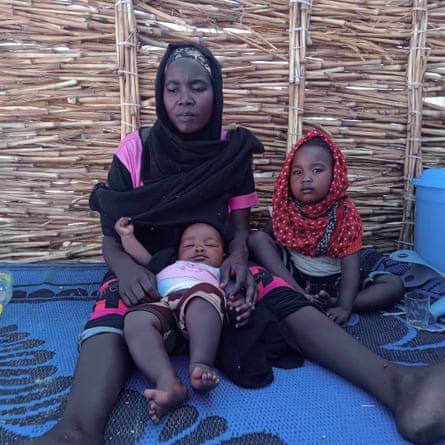Hundreds of displaced Sudanese people living in a refugee camp across the border in Chad have been unable to access vital medical care for injuries sustained during fierce battles in the Sudanese city of Geneina in the past year.
Some of those in the vast Ambelia camp near the city of Adré have permanent disabilities that could have been avoided had they undergone surgery, according to the refugees themselves and activists who are trying to arrange travel to Port Sudan in eastern Sudan, where they say medical facilities are relatively better than in Chad.
“There are not enough doctors here,” said Nour-eldieen Mohamed, the head of a committee at the camp that was set up to help transfer refugees to Port Sudan. “People need serious medical intervention, we’ve been waiting for a long time,” she added, as her eyes filled with tears.
The United Nations estimates that more than 10,000 people were killed in and around Geneina, the capital of West Darfur state, in fighting between Arab militias and non-Arab communities last year. Most of the dead were Masalit people, the main non-Arab community in the area. Thousands more fled over the border to Chad, joining refugees from previous rounds of conflict in Darfur.
The waves of brutal ethnic violence in Darfur stemmed from the war that began in the Sudanese capital, Khartoum, on 12 April 2023. The war pits Sudan’s regular army against the paramilitary Rapid Support Forces (RSF), an Arab group descended from the feared Janjaweed militia.

Jawahir Abdulrahman, 24, received a brain injury that left her right arm and leg paralysed when her mother’s house in Geneina was shelled in May last year, when she was four months pregnant.
While in hospital in Geneina, men from militias allied with the RSF stormed the facility, killing some of its staff. Her mother helped her on to a cart and they escaped, eventually crossing the border into Chad.
She later learned that her husband had been killed while also trying to flee to Chad. Both her grandmothers also died in the violence, she said, when the tent they were resting in was set on fire by militiamen.
“The militias tend not to kill women, that’s how I survived,” Abdulrahman said, while holding her youngest child. “So many people have been coming and going with empty promises [of medical attention], I don’t know when this will end.”
Adam Khatir, 60, a refugee at the Ambelia camp, is unable to walk and is in need of medical attention after being shot in the back and shoulder in May last year. He fled to Chad in June after sheltering without food or water for days on end in an abandoned school that had been turned into a makeshift clinic.

The United Nations’ refugee agency, the UNHCR, said the numbers of people crossing from Sudan into Chad had increased in recent weeks to a rate of 500-600 people a day. Dr Benoit Kayembe, the head of the UNHCR in Adré, said he thought food insecurity was now as big a push factor as the threat of violence.
Most of the new arrivals are from the states of West Darfur and South Darfur, where the army has conducted a campaign of airstrikes over territory controlled by the RSF that has killed dozens of civilians.
Many of the injured who arrive in the Ambelia camp were the breadwinners of their households. Now they are having to rely on limited aid, as little as five portions of sorghum, a nutrient-rich cereal grain, per month per refugee. Aid agencies say they are struggling to meet the needs of the refugees, and decry a huge funding gap.
Kayembe acknowledged that a language barrier between aid staff and local doctors was contributing to poor medical care. “The capacity of the hospitals is very limited,” Kayembe said, adding that the UN was trying to implement a more comprehensive healthcare system with Chad’s ministry of health.
Sudan’s war followed months of rising tensions over an internationally backed plan to transition to civilian rule in the country. Prior to the conflict, the army and RSF had been in a fragile partnership after toppling a civilian government in an October 2021 coup that derailed a transition from the rule of the Islamist autocrat Omar al-Bashir, who was ousted amid a popular uprising in 2019. Towards the end of 2023, the RSF made a series of rapid advances to consolidate its grip on Darfur, and it now controls most of the capital and the Darfur region.
On Friday the World Health Organization warned of a collapsing health system, with acute shortages of staff, medicines, vaccines, equipment and supplies, in Sudan itself.
Christian Lindmeier, a WHO spokesperson, told Agence France-Presse that 70-80% of Sudanese health facilities were not functioning because of the fighting. “Some states, such as Darfur, have not received medical supplies for the past year,” Lindmeier said. “Time is running out.”










